|
FIELDS
OF CONSCIOUSNESS
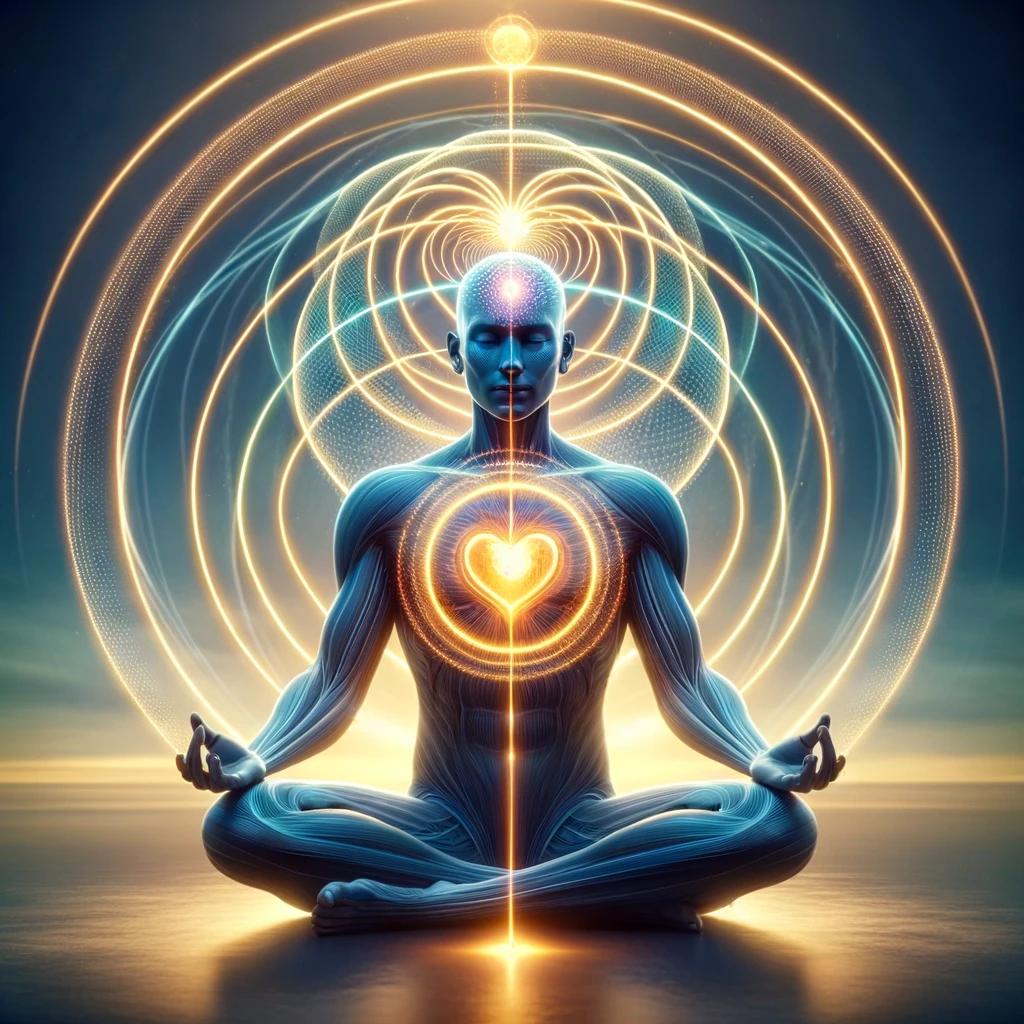
Much of the content that follows cannot be substantiated by current
physics or validated through mathematics. It is, instead, an
attempt to impose structure upon the experiences I've amassed
through a lifetime of meditation. This is not an academic
exercise, not a scholastic debate akin to pondering the number
of angels that can dance on the head of a pin. My aim is to give
form to those subtle, subjective experiences that tend to
dissipate under the rigid lens of scientific scrutiny, the kind
that cannot be pinned down in a laboratory setting. I am not
alone in these experiences; there are likely others who will
find a familiar echo in these words.
Quantum physics is often appropriated in overly simplistic terms
by new age spiritualists, inviting derision from scientists with
a positivist bent. Yet, every technological breakthrough from
the dawn of civilization has served as a means for us to
articulate and expand our understanding of the world. Inventions
are not just practical tools but also additions to our
conceptual lexicon. The creation of throwable weapons,
'projectiles,' gave rise to the notion of 'projects'—endeavors
of the imagination.
Thus, Meditaton.dk's allusions to quantum physics and
mathematics are intended purely as metaphorical projectiles. In
this vein, I invoke Einstein's sentiment:
"Imagination is
more important than knowledge.
For knowledge is limited to all
we now know and understand, while imagination embraces the
entire world, and all there ever will be to know and
understand."
Allow me therefore to reiterate a crucial point for both my own
reflection and the reader's consideration: the thoughts
expressed herein stem solely from my intuition and imagination.
So, let us set sail
on an odyssey of imagination to probe the essence, not of
consciousness as
'ding an
sich', but of footprints in the snow
left
by the unseen guest.
THE INTENSITY, QUALITY AND RADIUS OF CONSCIOUSNESS
At the heart of it, a human individual radiates within a
communal consciousness woven by the union of countless cells
within our bodies and brains. This cellular confederation
orchestrates a more focused manifestation of consciousness.
The Thousand Petalled Lotus in the Human Brain
As discussed in detail in the chapter
The Ouroboros Consciousness,
our brain and body together function as a lens,
concentrating the diffuse, eternal, omnipresent consciousness
that pervades all. Within this vast Brahmanic field, human
consciousness folds back upon itself in feedback loops,
transforming the minuscule human awareness into a
self-recognizing entity that sparkles like a celestial body in
the firmament of dormant consciousness. This diminutive yet more
luminous beacon is what Eastern spiritual practices have named
the Thousand Petalled Lotus. A similar enfolding of
consciousness may also transpire in higher primates and could
soon be conceivably present in sophisticated AI systems.

The more complex and capable of
feedback a system is, the more consciousness it can extract from
the omnipresent primordial pan-consciousness that seems to
accompany all
wavefunctions that have collapsed in matter.
In this context, human consciousness acts as an observer in a
universe that is already observed by an incredibly powerful
entity, capable of maintaining a state of primordial
pan-consciousness. This pan-consciousness is subtle and
pervasive but lacks self-awareness. In contrast, human
consciousness is potent but localized, with the potential for
exponential self-awareness through feedback loops.
The human brain-body system, with its intricate complexity and
exceptional feedback capabilities, can harness and concentrate
primordial consciousness into a light much more intense than the
faint illumination of divine omnipresence.
In this sense, god is unconscious
consciousness, and man is 'his' possibility to wake up.
This fundamental aspect of
divinity is mostly overlooked by atheists. However, Occam's
razor suggests the simplest explanation for the phenomenon of
humanity's obsession with various gods throughout history.
Instead of the atheistic or traditional religious viewpoints, consider the idea that the
concept of god is an imaginative and delicate mirror in which
humans project their highest potential for self-awareness. In
this perspective, god is an accelerating force of consciousness,
created by human brains.
As a child, I believed in Santa
Claus. Today, I consider myself a child of conscious
consciousness. Meister Eckhart asserts that what holds true for Jesus
Christ also applies to every good and noble person. Only a noble
person can peer through the mirror of mirrors. However, such a
statement was considered heretical, leading to his
'cancellation' by the Inquisition. Thank god that
consciousness today not (yet) is a trigger word.
The Intensity and Radius of Consciousness
Various elements, including age, health, intelligence, and
cultural background, can significantly influence the intensity
of our wakeful consciousness. In observing both myself and
others, it's evident that consciousness levels fluctuate. At
times, we exhibit heightened consciousness, while at others, we
are less aware. The spectrum of consciousness among individuals
is also diverse, ranging from those with intense but narrowly
focused consciousness, limited to the confines of their physical
being, to those possessing a broad consciousness capable of
empathizing with others' pain, even across different cultural or
tribal divides. However, this broader consciousness does not
necessarily facilitate change if it lacks intensity.
SPIRALING RINGS OF 'ME' & 'MINE'
The metaphor of the "Rings of Me and Mine"
captures the concentric nature of human consciousness, with each
successive ring representing an expanded state of awareness and
inclusivity. Within each circle lies what we intimately identify
as 'me and mine,' which we tend to with meticulous care.
Conversely, what falls outside our designated ring is deemed
'not me and mine,' placing it beyond our sphere of
responsibility and consciousness.
While numerous additional rings could be
conceived based on various criteria, the key insight remains
that the extent of our consciousness is determined by the
boundaries we set around what we claim as ours. We often neglect
the consciousness that resides in 'the other,' failing to
acknowledge it until there is an overlap of our realms of
responsibility. Consequently, our awareness and knowledge of 'the
other' remain minimal unless they pose a potential threat to our
'me and mine,' or we perceive an opportunity to acquire
something from them to call our own. In this view, living
systems have been expropriating energy — calories — from one
another since life's inception.
Yet, through a 'Promethean' lens of inherent optimism, I
perceive us as conduits for burgeoning consciousness, on an
anti-enthropian path from fragmentation towards unity, from
rejection to the rejection of rejections. Meister Eckhart
encapsulates this when he says:
"All creatures
contain one reflection: one, that is the denial of its being the
other; the highest of the angels denies he is the lowest.
God is
the denial of denials."
Meister Eckhart
Individual Body Consciousness

At the core of our consciousness lies the primary physical
consciousness, a realm where awareness is intimately entwined
with the physical self. This foundational level of consciousness
is deeply rooted in self-preservation and the desire for
well-being. In this primal sphere, consciousness is anchored in
the "I-am-ness" of the body. This intimate association
with the body shapes our earliest understanding of who we are.
It is vividly manifested in the way we refer to our physical
aspects – our arms, legs, and the entire body – using possessive
terms like 'my'. In defining the borders of consciousnness
though the word 'me' and 'mine' our attention span rapidly
decreases as soon as something is identified as not 'mine'. This
linguistic choice underscores a profound sense of personal
ownership and consciousness primal connection to our physical
form.
Seen in this light the body is not just a physical structure but
a vessel of identity and existence defined by the circle of our
conscious attention span.
Immediate Family and Environment Consciousness

In the next concentric circle of consciousness, our sense of
'me and mine' extends to encompass our immediate surroundings.
Predominantly, this includes the people closest to us – our
family and friends. In this sphere of consciousness, personal
emotional responses are more pronounced; we may find ourselves
deeply affected by the loss or suffering of a family member or a
close friend, while the troubles of distant others or widespread
human tragedies might not impact us as strongly.
This level also extends to personal belongings and spaces,
evidenced by phrases like 'my phone', 'my car', 'my home', and
'all my belongings'. These possessions and spaces are seen as
prosthetic¨extensions of ourselves, often holding significant
emotional or practical value. For instance, one might invest
considerable effort in making a representable home or managing a
business, viewing these endeavors as reflections of their
personal identity. At this stage, the citywall of consciousness
is built with the notion of not-me and not-mine, marking a clear
demarcation between what is intimately connected to the self and
what lies beyond that personal sphere of ownership.
Enhanced Tribal, Community, and National Consciousness
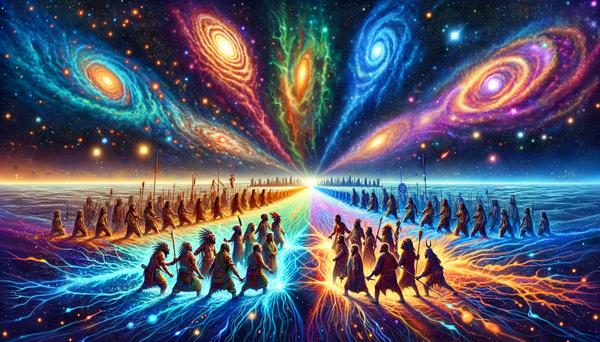
This exploration delves into the third concentric circle of
awareness, which spans a collective dimension often recognized
as tribal or community awareness. This layer embodies an
augmented sense of self that encompasses broader groups beyond
just our immediate relatives and acquaintances. In this sphere,
a person deeply involved in an organization, such as a mafia
member, may possess intense and honorable sentiments towards
their group, yet paradoxically, exhibit no guilt in harming the
children of adversaries. This duality is embedded in our ancient
genetic makeup, equipping us to become warriors in times of
conflict, capable of confronting others who, under different
conditions, might be considered comrades.
This realm of tribal awareness
gradually evolves into the concept of national consciousness.
Here, the connection to one's nation can intensify to the extent
that, in dire situations, individuals might willingly sacrifice
their lives for their country.
SHARED FIELDS
OF CONSCIOUSNESS
Let us now zoom
out and observe the human capacity in
nurturing extensive pools of collective awareness from a higher
level of abstraction. From
friendships to families, clans, tribes, and nations, the sphere
of concentrated human consciousness expands, encompassing
broader circles of internal empathy.
It's crucial to acknowledge that these expanded realms
of awareness, by their very nature, are linear and consequently
manifest a persistent barrier of denial and polarization, now
manifesting in broader circles of 'us versus them'.
This inherent tendency is likely a result of genetic
predispositions, with our social bonding mechanisms remaining
essentially unchanged since our days on the East African
savannas. Our brains, still attuned to Stone Age life, are
designed for survival within the realms of individuals,
families, friends, and tribes.
Compassion extended no further
until the advent of language. As noted by historian
Yuval Noah
Harari, humans are inherently storytellers. Language
facilitated the formation of connections extending beyond small
tribal groups, primarily with those sharing a common language
and stories. As history progressed, warfare and commerce became
pivotal in spreading languages and narratives. This expansion of
tribalism has evolved to encompass not only traditional societal
structures but also vast multinational corporations and
international organizations such as CERN and the United Nations.
These entities represent a modern iteration of 'systemified'
tribalism on a global scale, driven by shared goals, languages,
and collective narratives.
Quantitative Expansion and
Quality in Collective Consciousness
These communal fields of consciousness, although expansive
in their reach and intensity, typically do not reflect an
increase in quality. Often, especially in rapidly expanding
fields, there is a noticeable decline in the quality of
self-aware consciousness. This is akin to Spotify's algorithms
for pop music, which tend to gravitate towards the lowest common
denominator in their inherent drive for growth.
From sporting events to any
systemic organization of human social interaction, these fields
are nurtured by competition, existing within a dualistic
dimension. They require adversaries, engaging in zero-sum games
to siphon energy from their counterparts. However, cooperation
is also possible between such spheres, akin to human organs
working together to keep their human together.
Meditation.dk's idea of a collective, shared
field of consciousness shares similarities with Yuval Noah
Harari's concept of intersubjective reality but is not entirely
the same. While Harari's intersubjective reality is grounded in
language and storytelling, the collective field of consciousness
examines phenomena as they occur within consciousness as the
foundational base.
From this primordial grounded vantage point, collective fields also emerge from
various non-cognitive and non-verbal social dynamics.
Constructing a Group's
Intersubjective Reality of Consciousness
Creating an intersubjective reality of consciousness within a
group primarily occurs on two observeable levels:
1) Near-Sense Based collectivity
On one level, intersubjective connectivity originates from
pre-linguistic, physical proximity among individuals cohabiting
in close quarters. This primal tribal interaction leads to
synchronicity, even on subtle levels, as group members engage in
daily activities together. They physically inhabit the same
space, often emulating each other's mannerisms, fashion, and
more. They even share microbiomes, creating a communal field
from scent to sight. This intense synchronization fosters a
strong resonance within a smaller group, not reliant on language
for cohesion.
Recent research has revealed that attendees of a classical
concert can experience synchronized heartbeats, breathing,
seating, and
even skin conductivity.
Rockconcerts and technoraves for sure will follow the same
patterns of synchronization.
2) Storytelling and Intersubjective Realities in Groups
The power of narrative-driven fields of consciousness
intensifies as we extend our reach from personal networks into
the expanse of larger tribal affiliations. These expanded arenas
are primarily propelled by the sharing of stories articulated in
a common tongue. Our communal lore not only cements our unity,
from the camaraderie of sports teams to the collective identity
of nations but also enhances our prospects for thriving.
The most compelling of these fields synergize these two facets of
intersubjective connectivity: the esoteric potency of symbols
and rites, alongside the orchestrated prelinguistic collective actions, such
as those seen in military parades, big sport events, and
rockconcerts.
The Emergence of Digital Tribes in Contemporary Times
In the current digital epoch, the essence of tribal
consciousness has evolved dramatically. The ascent of social
media and the proliferation of online communities have catalyzed
the emergence of modern digital tribes. These cyber collectives
amalgamate individuals from diverse geographies, linked by
mutual passions, convictions, fears or endeavors. The digital
transformation of tribal consciousness is manifest across an
array of virtual arenas, from discussion forums and social
networking circles to specialized online networks. These domains
function as nexuses for dialogue, support, and the nurturing of
shared identities. Encompassing an array of interests, such
digital tribes range from eco-activism and anti-vax movements to
professional affiliations and politically or spiritually unified
factions, effectively challenging the historical hegemony of
institutional governance.
The onset of social media has triggered a reemergence of more
intimate, tribal-like segments within the digital landscape.
Mobile devices, particularly smartphones, create an illusory
veneer of tight-knit proximity, echoing the tribal bonds of our
prehistoric ancestors. Instances abound, from young people
influenced by online radical propaganda, showcasing how social
media can disrupt the move towards a more integrated global
consciousness by fostering virtual microcosms of tribal
mentality.
Nonetheless, it's essential to acknowledge that, presently,
these intimate
online communities paradoxically are devoid of the element of physical
proximity ad synchronicity afforded by direct sensory engagement—a gap that
the advent of virtual reality technology may bridge in the near
future.
The Role of Consciousness in Non-Verbal and Non-Physical
Synchronization
It's important to delve into an aspect that remains largely
unexplored by science and documentation: the ability to
synchronize within a shared field of consciousness without
relying on language or the exchange of micro-signals, even at
the most subtle levels.
To the best of my understanding,
Carl
Gustav Jung is one of the few who has addressed this kind of
synchronization:
There are
psychic parallelisms which simply
cannot be related to each other causally.
C.G.Jung
As I intuite it, individuals
deeply connected through strong fields of consciousness and love
appear to possess an extraordinary form of intuitive knowledge
about each other. This includes an innate understanding of each
other's locations, emotions, and thoughts even when separated by
great distances.
This phenomenon of precise synchronization becomes particularly
pronounced during collective meditative practices. In such
instances, the synchronization can verge on the paranormal. My
years living in India exposed me to numerous accounts of such
intuitive connections, shared with and by spiritually advanced
individuals.
Furthermore, a personal experience I had recently with a friend,
just a day before composing this text, profoundly exemplified
this phenomenon. I am quite confident, that the readers who have
followed me this far, would have many similar stories to
narrate.
From this paranormal vantage point it is now time to dive into
the biggest mystery of all in the workings of consciousness.
COSMIC UNITY CONSCIOUSNESS

Cosmic unity consciousnness presents a completely new
transformative approach. Through the cultivation of
consciousness in its essential form, it transcends biologically
inherited tribal divisions. Seen through a historical lens,
cosmic unity consciousness first happened on the Gangetic Plains
and then later
along the silk
roads more than 2.000 years ago.
In Emptiness I am everybody
"Wisdom tells me I
am nothing, love tells me I am everything.
Between the two, my life flows"
Nisargadatta Maharaj
There are many ways of understanding non-duality.
In this context, by non-duality, I am referring to a state where
Buddhist 'shunyata', or emptiness, encompasses everything,
particularly recognizing all living beings as part of a unified
whole. Here non-duality takes us from the understanding of that
there is no 'other', to the understanding that I am everybody
else.
In this qualitative different mode of consciousness the extended compassion
of 'metta'
(loving-kindness) embraces everyone, regardless of caste, creed,
or culture, in a spirit of universal oneness.

Your deepest roots are in nature.
No matter
what you are, where you live,
or what kind of life you lead,
you remain irrevocably linked
with the rest of creation.
Charles Cook
The Self-referential Ouroboros
Consciousness
I characterize cosmic unity consciousness as a field that is
both intense, expansive, and qualitative intelligent. The
emergence of the non-dual cosmic consciousness begins when
consciousness starts to reflect back upon itself, a concept
explored in the chapter on 'Ouroboros
Consciousness.' This self-reflection in feed-back, even in
its nascent stages towards a more unified state, profoundly
impacts both the depth and breadth of the conscious field. I
would dare to go so far to postulate that a consciousness who
has not as a minimum entered the ouverture of the Ouroboros
symphony cannot transcend the brain-harware set limitations of
tribal duality. It is the destiny of Ourorobos consciousness to
colonize the universe.
It is now time to delve deeper into the workings of this
wonderful phenomenon.
When the soul lies down in that grass,
the world is too full to talk about.
Ideas, language, even the phrase “each other”
doesn’t make any sense.
Rumi
GROUP MEDITATION
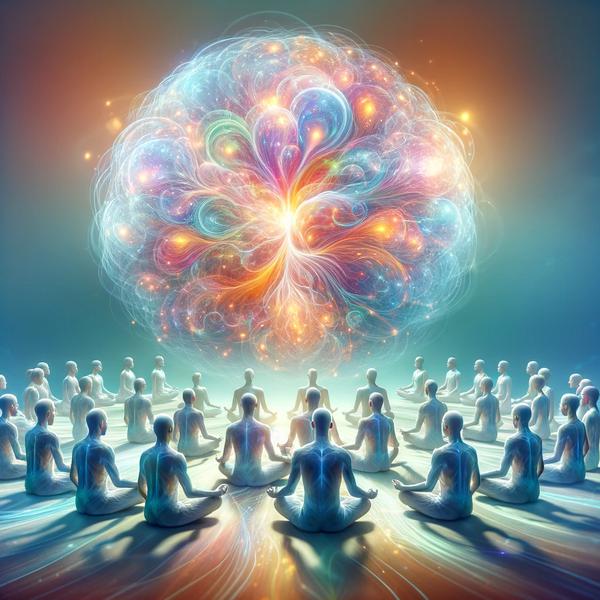
Group meditation transcends the mere concept of individuals
meditating together; it functions as an advanced interface for
fostering hyper-tribalization enhancing social connections.
This dynamic approach allows participants, often strangers, to
swiftly cultivate profound intimacy within a distinct yet
impersonal setting. Deep engagement in this shared activity
leads to the shedding of surface-level identities, allowing a
simultaneous exchange of a unique essence of presence. This
experience, unique to group meditation, nurtures a sense of
unity and personal connection that is both deep and singularly
individual.
A Shared Field of Consciousess
Initially, group meditation
mirrors the process of solo meditation, intensifying our
empathetic self-connection. When we close our eyes during
meditation, our body awareness is immediately amplified,
grounding us in a realm of
"I am Me" consciousness, centered around our physical being.
This heightened awareness then extends beyond ourselves,
allowing us to become more aware of our surroundings, even with
our eyes closed. In this introspective state, we become attuned
to the presence of others nearby. This progression into "You are
part of Me" consciousness deepens our connection with those
around us, fostering a profound, intimate bond that transcends
language, where words, while helpful, are not necessary for this
shared experience fo precense.
Group meditation swiftly and powerfully activates bonding
processes typically associated with family and friends,
frequently exceeding the depth of traditional familial
connections. This powerful dynamic has the potential to
transform ingrained behavioral patterns. During group meditation
sessions, intense bonds are formed quickly, achieving in a brief
period what would normally require years. Remarkably, these
connections often arise even between strangers, shedding light
on why individuals participating in more secterian meditation groups might favor these newfound
relationships over long-standing family bonds.
As a general rule, group meditation unfolds
as a linear expansion of the
collective consciousness. A notable indicator of this linear
extension in the consciousness circle is the emergence of an 'us
versus them' mentality, which manifests as a 'we are holier than
you' attitude. As explored in the previous chapter, "Fields of
Consciousness," our tribal legacy of forming bonds typically
evolves from smaller units to increasingly larger collectives,
such as nations. This progression often creates a metaphorical
protective barrier, delineating a sense of order (cosmos)
in contrast to disorder (chaos), reflecting our innate
tribal instinct to define and protect our group identity.
Let us now look at the mysterious
glue that connects us in such a state of collective
consciousness.
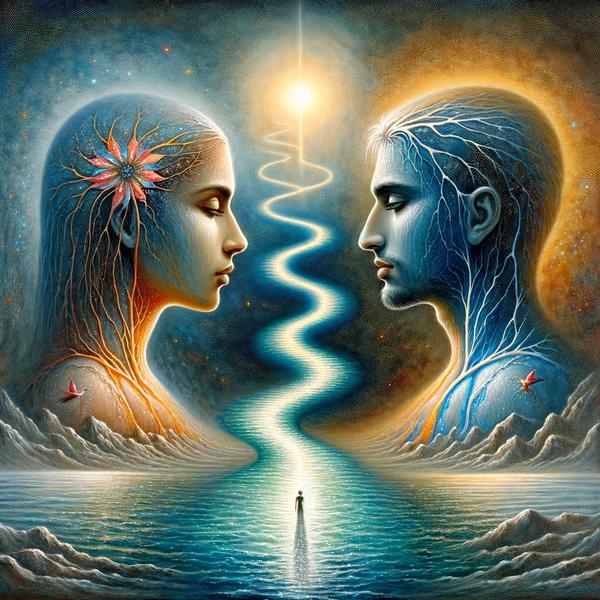
The river that flows in me also flows in you
Kabir
THE UNCOVERING OF THE HEART & THE AVATAR INTERFACE
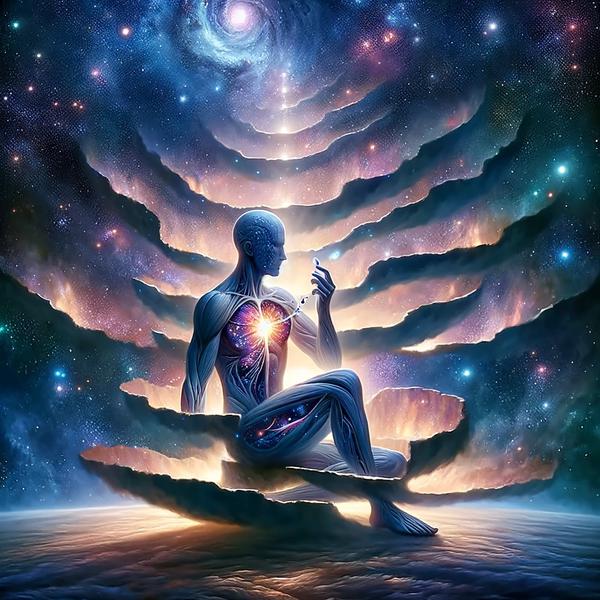
"A human being has so many skins
inside, covering the depths of the heart.
We know so many things, but we don't know ourselves!
Why, thirty or forty skins or hides, as thick and hard as an ox's or
bear's,
cover the soul. Go into your own ground and learn to know yourself
there."
Meister Eckhart
Meister Eckhart's profound insight
reveals that within each human being lie multiple layers, akin
to skins or hides, that shroud the true depths of the heart. He
emphasizes our extensive knowledge of the world, yet a startling
lack of self-understanding. These layers, as numerous and tough
as the hides of oxen or bears, serve as barriers to our soul,
urging us to delve into our inner selves for true
self-awareness.
This metaphor extends to the concept of group consciousness and
the necessity of open vulnerability for its realization. Our
emotional wounds, manifested as weaknesses, insecurities, shame,
and guilt, often remain concealed as we, as social beings, are
conditioned to mask our vulnerabilities. This protective
mechanism is the role of the ego, designed to shield us from
both external judgment and internal scrutiny, ensuring our
survival in a social hierarchy where showing weakness can be
perceived as a liability.
These 'thick skins' that The Meister refers to are the facades we
present to the world, preventing us from achieving a deeper
connection with the fragmented parts of our being, and, by
extension, inhibiting the potential for true symbiosis within a
group. Only by shedding these layers and embracing vulnerability
can we hope to achieve a more profound, collective consciousness
and self-realization.
Authenticity is rooted in vulnerability.
When the setting of a meditative space feels safe,
individuals begin to trust and acknowledge their vulnerabilities
to themselves. This is the first step towards authenticity,
moving away from the need to impress or adopt false personas. In
such a space, people engage in collective, impersonal
vulnerability, which is the
essence of authenticity.
The Avatar plug
The concept of the Avatar plug in the movie 'Avatar'
metaphorically illustrates this principle. The hero's connection
with his dragon through a physical cable symbolizes the union of
human and ancient kundalini power, achievable only through
nobility, honesty, and vulnerability. This connection represents
a 'stargate' or a pivotal point, opening the pathway to profound
self-awareness and power.

In an ideal group meditation,
participants relinquish their defensive mechanisms, embracing
openness and vulnerability. This state allows for a genuine
connection with one's true power. Openness to vulnerability
heightens sensitivity, facilitating a deeper introspective
journey.
In this sensitivity,
we all plug into each other in a collective state of oneness.
However, it is crucial here to distinguish between narcissistic
vulnerability and the type of sensitive openness in a meditative
field. The meditative openness is impersonal and not disturbed
by storytelling made by the mind. In impersonal
openness, we 'aware' all
'aware' all inner sensations
without naming them.
However, this field is only as powerful as its weakest link. Just one person's
unconscious unwillingness to be vulnerable affects the intensity of
the whole field. If everybody in a meditative circle could let
the wound be open, the intensity of the field would grow
exponentially with the number of participants. However, a larger
number of individuals in the circle as a general rule make people feel less safe,
and hence the field gets weaker.
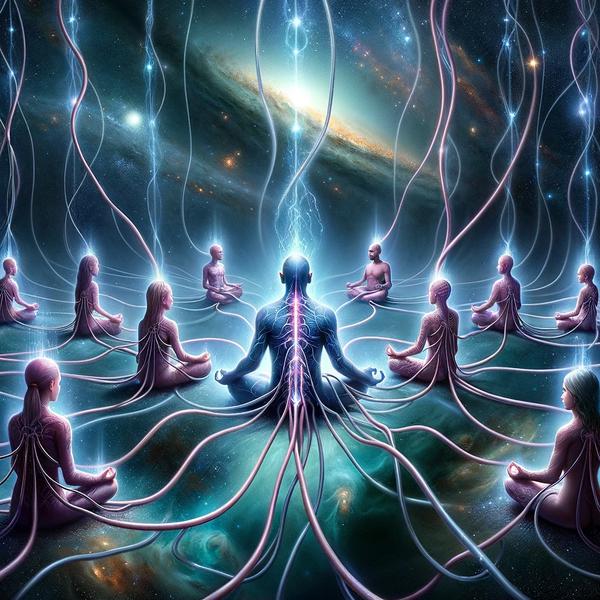
THE IMPORTANCE OF THE STORIES WE TELL OURSELVES AND OTHERS
The stories we weave for ourselves and share with others
hold significant power, shaping our perspectives and emotional
states. Achieving a state of openness hinges largely on the
narrative we construct internally. The right story can foster a
sense of open vulnerability, leading to growth and
understanding, while an unhelpful narrative can trap us in a
cycle of despair.
A compelling example is the journey of Olympic meditation master
Mingyur Rinpoche, who suffered from intense anxiety and
panic attacks in his youth. He transformed his experience by
altering the narrative he lived by. Instead of viewing his
anxiety as a debilitating force, he reframed it as a beneficial
ally, a potent source of energy for his meditation practice.
This shift in perspective profoundly changed his relationship
with his anxiety and more importantly, it improved his
meditation practize.
Viewing oneself as a victim is the problem child of our time. It can be likened to a spiritual
malaise, limiting personal growth and inner peace. Conversely,
reshaping one's narrative to see oneself as an overcomer, facing
and surmounting challenges on the path to triumph, can
drastically alter one's life trajectory. This approach empowers
individuals, turning obstacles into stepping stones towards
personal fulfillment and achievement.
However, in the context of group
meditation, it's crucial to establish a connection with the
unspoken aspects of our internal wounds. These wounds can
effectively serve as an 'avatar plug' only when acknowledged as
forms of 'energy' within our conscious and aware selves. While a
well-crafted story can create the environment for a shared
consciousness field, it should not intrude into the core of this
experience. It should never enter the octagon itself. In this
communion with oneself, words have no place; the interaction is
beyond verbal expression, emphasizing a wordless connection
between your inner self and the collective consciousness.
AUTHORITARIAN FIELDS AND THE ROLE OF THE GURU
I am a finger
pointing to the moon.
Don't look at me; look at the moon.
Buddha
Throughout my
extensive observation of various meditation practices, I've
realized that these spaces are often deeply rooted in ancient
storytelling, particularly in the way they establish their
meditative framework. This leads to a natural inclination
towards a leadership-centric model. Despite our idealized
notions of egalitarian hunter-gatherer societies, democracy, in
my view, is a relatively recent and more fragile social
structure in the span of human history. Historically, we have
predominantly lived under leadership systems, and this tendency
becomes even more pronounced in times of crisis or upheaval, a
common catalyst for individuals embarking on spiritual journeys.
Consequently, it's common for new age meditation groups to
revolve around a central leader. However, in our modern era,
these hierarchical systems are increasingly misaligned with
contemporary societal needs. In fact, the overly top-down social
systems often observed demonstrates a regression, a fall back
into archaic systemic interfaces used in previous historical
periods.
In meditation, particularly within
a group setting, the biggest hurdle is often the ego's
well-intentioned but obstructive efforts to protect us. In
hierarchical structures with an authoritative leader,
participants might relinquish their egos to this leader,
resolving the issue of self-protection, albeit at a significant
cost. Such authoritarian environments can amplify the group's
collective energy but may also suppress meta-consciousness and
independent thinking. This is evident from historical and
contemporary examples where sects under strong authoritarian
influence have led to destructive outcomes.
Acknowledging the inherent risk of power corrupting leaders,
from gurus to politicians, a horizontal structure in meditative
groups is favored. In such a setting, mentors and teachers
understand that their knowledge doesn't equate to control over
the group. Instead, they lead by example, fostering individual
freedom and inspiring participants to tailor spiritual teachings
to their personal journeys. This model nurtures a community of
shared learning and growth, where positive storytelling thrives,
unimpeded by the pitfalls of authoritarian leadership.
This perspective does not negate the value of spiritually
advanced leaders and teachers who lead by example rather than
command. The principle is straightforward: while I may possess
extensive knowledge about the moon, and thus can inspire others
by sharing this knowledge, it doesn't imply ownership of the
moon. My role is to enlighten and motivate through my own
experiences and understanding, recognizing that wisdom is a
shared resource, not a possession.
"A man chooses
the religion and path of his friend."
Sufi quote
In this regard, the Sufi tradition
is especially commendable. They often employ the term 'companion' to
describe the relationship between the wise ones and their
followers. This choice of wording highlights a sense of
camaraderie and mutual journeying on the spiritual path, rather
than a hierarchical teacher-student dynamic. It underscores a
shared experience of discovery and enlightenment, emphasizing
the value of collective wisdom and mutual respect in the
spiritual journey.
One of the most extraordinary spiritual inspirators I met was
Papaji from Lucknow. His
sense of humour was second to none, but there was always stern
advices embedded in his words. He said:
"If a teacher tells you to do
this or that
he should not be called a teacher.
He should be called a butcher!
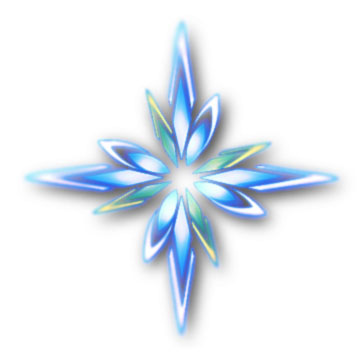
Don't listen to anyone!
Don't even listen to me!
Listen to your own Soul

A true Masters message can only be:
There is no teaching
There is no teacher
There is no student"
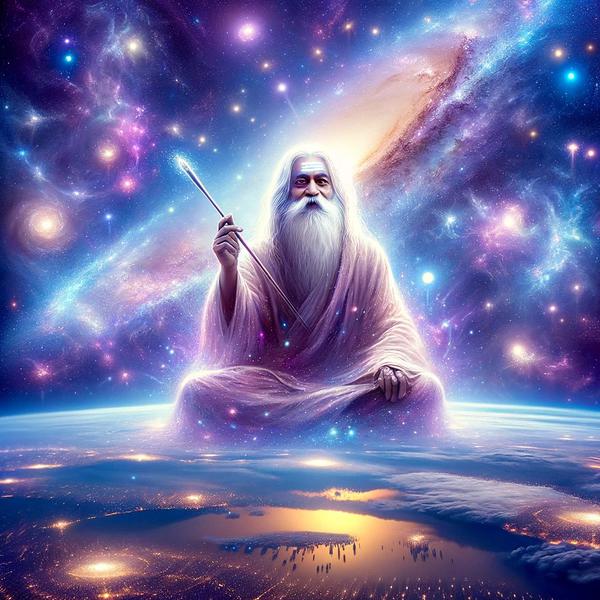
This guy will not tell you what to do. I guarante that.
Because I created him - with the kind help of Dall-e.
Fundamentally we always create our own gurus.
EVERSIVE GROUP MEDITATION
Let's now contemplate the potential of a qualitatively distinct
field. Imagine if a group were to gather, each person
potentially embodying
what I previously have described as
cosmic eversive ouroboric
consciousness. As for my personal experience, have I encountered this eversive
ouroboric unity consciousness? Perhaps only in fleeting moments,
but these glimpses are enough to convince me of its tangible
possibility. However, it's important to acknowledge that the
meditation group I currently facilitate is more linear in its
capability, and has not yet embraced the eversive aspect I now
am going to elaborate upon.
Eversive Circles of Holy Ghost
In the utopian realm of group meditation, I've occasionally
glimpsed a profound phenomenon. Unable to empirically prove, yet
compelled to share this story-telling, I recount experiences of
transcending my own physicality when deeply secure among others
in a similar state of surrender. In such moments, I occasionally
experience a sudden shift, finding myself within another
participant's body in the circle. In this state, I can sense and
perceive the emotions and visions of both individuals and the
group collectively. Concurrently, there's an awareness that
others in this shared field also possess access to this communal
knowledge, creating a profound sense of interconnectedness and
shared understanding.
This collective experience, reminiscent of the Christian notion
of the Holy Ghost, resonates with Jesus' words about his
presence among those united in his name. Here, the communal
consciousness manifests as the Holy Ghost itself. In this state,
I become part of this collective spirit, expanding into the
totality of existence. This transcendent experience defies
linear group consciousness, evolving instead into an eversive,
oroboric implosion encompassing all.
Cosmic Unity Consciousness is the denial of denials
In eversive ouroboros meditation, 'tribality' is nullified. I'll make
sure to repeat the Meister to clarify things. Meditation is, in
its ideal essence, the denial of denials.
All
creatures contain one reflection:
one, that is the denial of its being
the other;
the highest of the angels denies he is the lowest.
God is the denial of denials.
Meister Eckhart
In the Buddhist compassion
traditions, the monks are not praying for the well-being of
their football team. They pray for all living beings. Such is
the essential nature of cosmic consciousness: It expands in
eversiveness until it has conquered all duality. The final conclusion
is reached with this statement:
Tat twam asi -
You are that
Therefore Meister Eckhart says
that you
must be free from
naught. (not)
To be undivided you must be free from not.
In this state, the 'I am you'
realizes that it is everything, not even sentient beings but all
collapsed waveforms. This is why I kiss my fridge door when I
come home after a long journey. Then I say hello to the walls
and my sofa, and they all seem to respond in a glow. This
happens when the omnipresent eversive pan-consciousness merges with the
stronger light coming from the torch of the human brain.
The mysterious glue of
love
All strife, every disagreement, every cancellation is based on a deep down
notion. It says:
I am not you.
In states of expanded Consciousnss, the first
fundamental realization is:
I am You.
In expanded states of
consciousness we become empaths
Cosmic
consciousness serves as a unifying force, enabling us to not
only see but also become the viewpoint of 'the other.' In
Christianity, followers are taught to love their neighbors as
themselves. However, when filtered through the thinking mind,
this becomes a commandment to be obeyed like a traffic rule. It
turns into an action we believe must be done, and when we
forget, we feel guilty and revert to our collectively created
morality to correct our behavior. As consciousness expands in
quality and quantity, the astonishing revelation emerges that
our neighbor is, in fact, ourselves. Loving sentient beings then
becomes a natural and spontaneous consequence of cosmic consciousness.
The group meditation field is using the drivers from our ancient
tribal interfaces. However, when it grows not only in expansive
intensity but also in eversive meta-aware quality, it holds the
possibility to transcend the limitations of its own archaic
programming that for thousand of years have set us in duality in
opposition to others.
In this blessed space we pray for all sentient beings. We merge
with everyone and everything while bridging the gap between
duality and non-duality with the help cosmic glue of love.
In the Pantheon of beautiful meditative phenomenons this is the
most beautiful.
|













